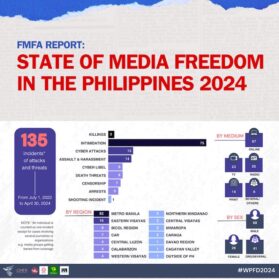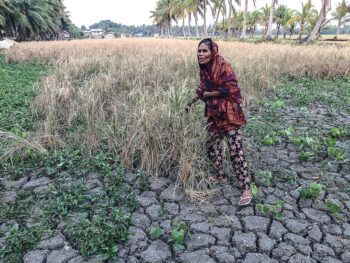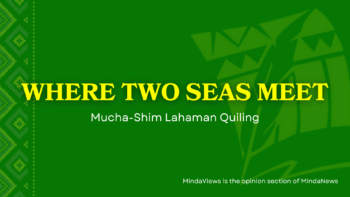“Every war is ironic because every war is worse than expected. Every war constitutes an irony of situation because its means are so melodramatically disproportionate to its presumed ends.”- Paul Fussell, The Great War and Modern Memory
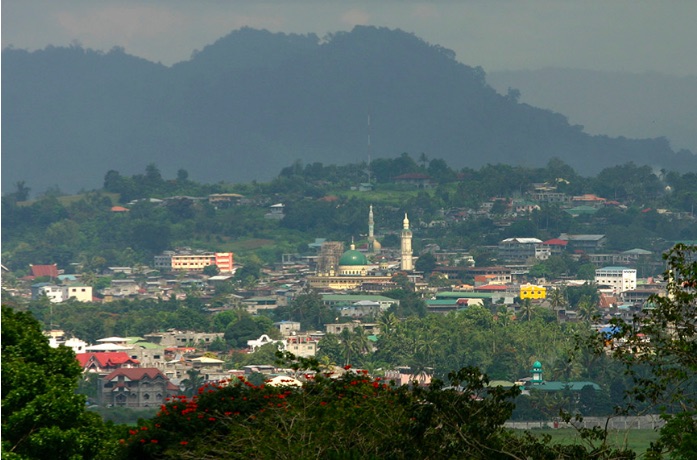
QUEZON CITY (MindaNews / 21 July) — “Our house in Raya Madaya is in ashes. Definitely it was bombed. Also my aunties’ houses nearby were also razed by fire,” my cousin told me in Maranaw language when I called him to ask and confirm.
I had nothing to say but to comfort him. Their place was one of the first barangays where fierce exchange of bullets and bombs rained. I could feel his wretched voice. All their hard earned properties were in that house. The aerial drone photos show clearly the gravity of damage in Marawi. He added, “we wish our grandmother’s old house is still intact so that we can have a place to stay in once this is over.”
My cousins, scattered and displaced, are in Iligan City and some other siblings and relatives are in Cagayan de Oro City where they stay as evacuees.
A few days ago, my auntie on my mother side posted on FB “Sabr ku Allah” (We ask God for more patience). Her house in Lilod was also burned. Seeing the photo drove home the truth of the effects of war. My sister’s house in Banggolo was also burned. Really heart-breaking. And my mind says to me that the house burned is not just a house. It was a home to the family and to all relatives. It was also a place for gatherings, special occasions, moments of memories.
These are just stories from among the 250,000 or more people whose houses were burned or bombed, who are displaced, who left their houses with no choice and who now long to go back home. Their own stories are still unheard and waiting to be revealed.
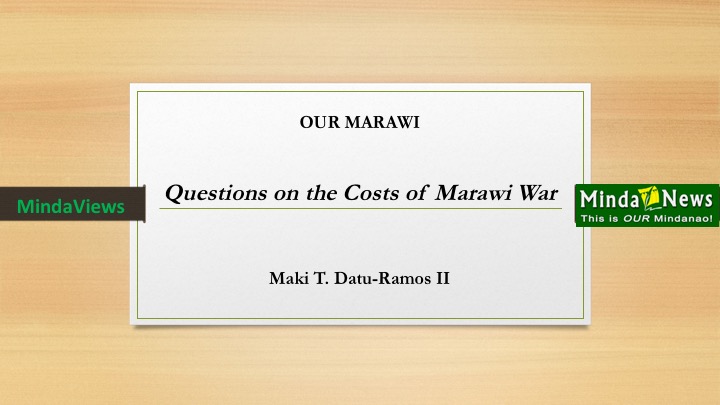
As days and weeks and months came and the destruction increased, the common plea of the Maranaws is that they could accept what happened as long as for every bomb dropped, there would be dead ISIS/MG enemy also. They surrender their fate to God. They trust the decision of the government or the military to topple the heartless and cursed radicals whom they primarily blame for this senseless attack.
All public policy choices involve a tradeoff of costs and benefits. The present administration, when it declared martial law as a decision to stop terrorism or rebellion must have known of course the ultimate aim and the benefits of such war against Maute Group / ISIS. Ordinarily in administration or business principle, the purpose should be worth the cost, or the short or long term benefits should exceed the costs or expenses. Understandably and necessarily, the government is mandated to preserve the country’s territory and protect its sovereignty.
But at what cost? In the early days of the battle, we were confident that such siege will be suppressed in just a matter of days. But as two months passed, we found out that the enemies are well prepared and well equipped and that the true costs of war are underestimated.
In war, definitely lives of the soldiers and civilians will be lost. That’s the sad and inevitable part of any war. The estimated casualties from the military is almost a hundred by now. We pray this figure will end. We don’t know yet the daily costs of battlefield operations. As ordinary citizens, sometimes we are curious how do the government will provide for the long-term medical, hospital and disability care to the wounded soldiers which according to the media the number of which rises to 600. Also, we heard that maybe 5,000 to 10,000 foot soldiers are in Marawi and Lanao del Sur. How much are being spent by the troops? How much will be needed by the families and children of our fallen heroes? And if martial law will be extended up to end of December, how much more will be the estimated overall budget to be allotted just to fulfill the aim of the war and intention of martial law?
How about the costs of the bombs from jet and helicopter airstrikes? A free-fall bomb from the jet costs 150,000 to 200,000 pesos. I am not so knowledgeable about the prices of bombs but that’s what my reading says. To illustrate, if ten bombs are dropped daily for two months for example or that is around 600 bombs, the cost will be hundred millions of pesos more or less. Is it only 600 bombs that were used? How about the bombs from cannons and ammunitions? Only the military can tell how much was spent already in the combat operation since May 23. As taxpayers, we need to know how much so far are the total costs which can be quantified and estimated.
During the Erap-initiated all-out war against the Moro Islamic Liberation Front (MILF) in 2001, billions of money were spent by the government. Series of battles were won and announced. To sum up, Mindanao wars for a period of 1970 to 2001 had cost the Philippine government a staggering P2 trillion an amount nearly equivalent to our past P2.6 trillion 2015 national budget. Billions were also spent for peace efforts but war still lingered on in Butig and in Piagapo, Lanao del Sur. And now in our beloved but devastated Marawi.
This reminded me of the costly war that US made against Iraq for alleged weapons of mass destruction. It spent three to five trillion dollars just to stop Saddam dictatorship with 300,000 casualties. It also spent 600 billion dollars just to run after Osama bin Laden and fight against Taliban with 91,000 Afghan casualties. Yet, the said wars begot more wars like insurgency and terrorism in Iraq and in the entire Middle East resulting to US economic and bank meltdown and refugee crisis in Europe.
My worry, on the other hand, is the major economic cost of the war suffered by Lanao people and the Mindanawons. Mindanao, which has notorious name in the world stage for the kidnappings of the Abu Sayyaf Group, is now tagged as terrorist lair or ISIS province in Southeast Asia. Investors and businessmen will have second thoughts to put their money in this unstable land. The country’s entire economy and image in general will always be affected. The money that should have been spent for schools, roads and vital infrastructure is already diverted and being waged for the war and implementation of martial law. Sadly, we spent money for war just to spend again for the rehabilitation of the places caused by war.
But our real worry also is not just the loss of lives and property of hundreds of thousands of innocent people or Maranaw civilians. They just want to move on but how can they go back to Marawi, stay and live in their burned and bombed houses? How can they work and be given new livelihood? How can they start over? How can they be healed for their emotional trauma and psychological scar? We worry that their disappointment would turn to frustration and then to anger against the government or anyone who caused this tragedy. They think that the government headed by their own blood is supposed to serve and help them in the first place, if not bring lasting peace and development.
It seems that the government, when it is asking for martial law extension is sending a perplexing message that our military is not defeated but it is also not winning the war against the ISIS/Maute Group. That is the most heartbreaking news because as citizens and as Maranaw, you feel like you are in the midst of uncertainty and even confusion. In this time of war, we need more feeling of assurance and sense of stability for our future. Otherwise, our enemies, though losing hopefully and finally, might be winning the battle for the hearts and minds of those who lost so much in this war, who got so much untold sufferings and hidden heartaches.
This is what we fear most. The enormous but unquantifiable and unestimatable costs of war. That is indeed more worrisome.
(MindaViews is the opinion section of MindaNews. OUR MARAWI is open to anyone who wishes to share his/her thoughts on what is happening in Marawi City, the country’s lone Islamic City. Atty. Maki T. Datu-Ramos II is a historian, former public attorney and prosecutor, a Maranaw whose parents and relatives are from the besieged Marawi).


